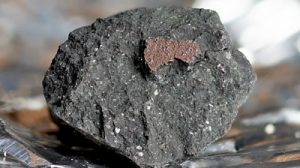Winchcombe meteorite:

A piece of the Winchcombe meteorite that touched down in the town of Winchcombe in Gloucestershire in the UK in February 2021 will be displayed at the National History Museum.
- Meteoroids are objects in space that range in size from dust grains to small asteroids.
- But when meteoroids enter the Earth’s atmosphere they are called meteors.
- But if a meteoroid enters the Earth’s atmosphere and hits the ground, it is called a meteorite.
- The piece of meteorite, which is a 103-gram fragment of black rock resembling coal, was found in a field by one Mira Ihasz and a team from the University of Glasgow.
- The meteorite landed in the driveway of a house located in Gloucestershire in February and considered “astonishingly rare”.
- It dates back to the birth of the solar system nearly 4.5 billion years ago and therefore examining it may offer scientists clues about the beginning of the solar system and maybe even the Earth.
- Winchcombe is also significant because it is the meteorite to have fallen and recovered from the UK in about 30 years.
- Further, this type of meteorite is known as a carbonaceous meteorite and out of about 65,000 known meteorite types, only about 1,000 are of this particular type.




